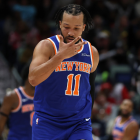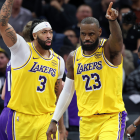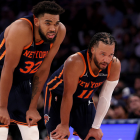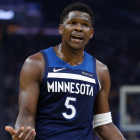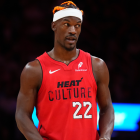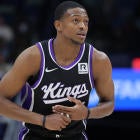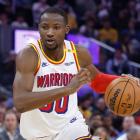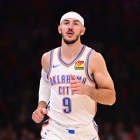Last Thursday, Steve Kerr said the Golden State Warriors owed it to themselves and their fans to be better. The Boston Celtics blew them out in their previous game, their fifth home loss by 20-plus points, and they were preparing to host the No. 2 seed Denver Nuggets. With 18 games left in the season, he felt it was time to turn it up and lock-in.
"We've had to pace ourselves somewhat the last two seasons, and I think you can tell," Kerr told reporters, via the Mercury News' Mark Medina. "That's over with."
Kerr said that the Warriors, champions in three of the last four seasons, had a discussion about purpose: Why are we doing this? He mentioned wanting to honor their final season at Oracle Arena, and he said that the players made it clear they want to hold off the Nuggets and keep the No. 1 spot.
"We compete, can't nobody beat us," Draymond Green told reporters. "And even sometimes when we don't compete, people still can't beat us. But we haven't been competing."
The next day, Golden State crushed Denver. It opened the game on a 20-6 run and led 67-50 at halftime. It held the Nuggets' high-powered offense to 38-percent shooting and won 122-105, taking a two-game lead in the standings.
The reaction: Switch, flipped. The Warriors had reminded the league that they are still an impossible problem to solve when they are playing with pride. They had put Denver in its place.
Given the circumstances, Kerr told reporters that he would have been shocked if they hadn't played well. With players talking about the importance of home-court advantage in the playoffs, it felt like a turning point.
Two days later, Golden State lost to the Phoenix Suns.
Klay Thompson called it the worst loss of the season. Kerr said the Warriors deserved to lose, thanks to a lack of energy, execution and connection. It was Phoenix's first road win against a Western Conference team all season, and it had lost the previous 19 games by an average of 17.9 points, per ESPN Stats and Information. It improved the Suns' record to 16-52.
Sunday's loss raises several questions: Why does one of the best teams ever assembled have such trouble with consistency? What do professional basketball players owe fans in terms of terms of effort and focus throughout an 82-game season? Are letdowns a product of human nature or a cause for concern?
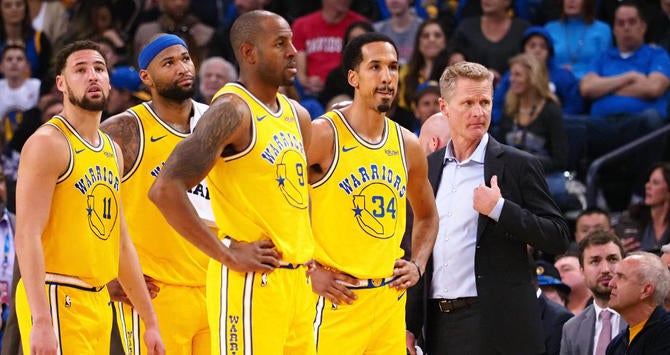
On the first day of November, Golden State appeared trouble-free. They were 8-1 on the season, and players were saying the right things about enjoying the process rather than looking forward to the playoffs. At practice, Stephen Curry sat on a training table with a clipboard in his hands. Next to him were Green and Kevin Durant, watching the two-time MVP draw up a play. On the phone, assistant coach Ron Adams described the scene as if merely witnessing it made him the world's luckiest man.
Ever the worrier, though, Adams cautioned that no team can be in harmony all the time. For teams that have won multiple championships, regular-season enthusiasm can be elusive.
"You are always worried about the motivational aspect," Adams told CBS Sports. "Especially during the regular season because there's kind of a mentality about let's get to the playoffs and we'll be fine. Because it's a process that you follow and the process involves trying to stay sharp fundamentally, trying to stay sharp schematically and growing just like anyone in any job tries to do. So that can be a little tricky."
The season is long, tiring and tedious, so maybe finding motivation is just another challenge that the best teams need to face. No fan wants to wonder whether or not his or her favorite team is playing hard, but perhaps an absence of energy is not a reflection of arrogance or indifference. What if "flipping the switch" isn't exactly a choice? Should we just accept that it is almost impossible for players to trick themselves into believing that games against the Nuggets and Suns are the same?
Adams described Kerr as "forward-thinking" in this respect. "There are just multiple things -- some of them very odd, unusual -- that motivate our guys," he said. "Steve and others in the staff try to come up with ideas about how to do that." During Super Bowl weekend in his first season in Golden State, practice featured a football competition, with players running routes in the gym. Thirteen months ago, he famously had the players coach themselves against Phoenix and came away with a blowout win. As competitive as Kerr is, he empathizes with his players, partially because he remembers what it felt like trying to three-peat with the Chicago Bulls.
This season, the Warriors' defense has been worse than normal. They have allowed 109.3 points per 100 possessions, which ranks 14th in the league. For a team that isn't always engaged, this makes sense. Defense is the less fun half of the game, the part that makes someone like Kerr say his players need "a passion and an anger and an intensity" when they don't do it properly. Last season, though, Golden State finished 11th in defensive rating and was terrible on that end down the stretch of the regular season. As NBA.com's John Schuhmann pointed out, the Warriors went on to rank first in that category in each round of the playoffs.
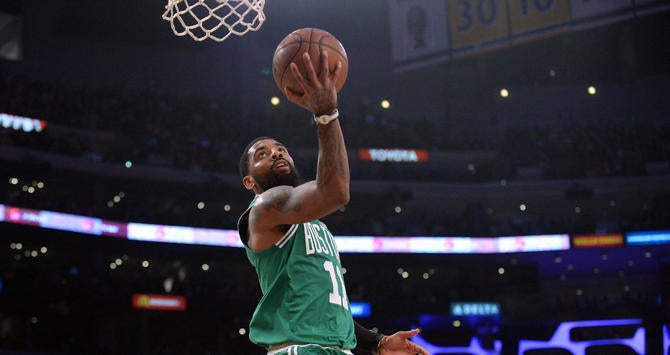
I've been a bit obsessed with "Free Solo" since watching it. The Oscar-winning documentary follows Alex Honnold, a world-class rock climber, as he attempts to become the first to climb El Capitan, Yosemite's approximately 3,000-foot granite monolith, without ropes. The ascent itself is thrilling, but the film is more about the preparation he put into it -- since he knew and practiced every movement he had to make, he could stay calm mentally and not find it daunting. It was also about what would possess a man to challenge himself this way, knowing the risk. Honnold says on camera that, if he fell, "my body would explode on impact."
In an interview with The Guardian's Sam Wollaston, Honnold said that he loves climbing because it feels "playful and fun." Most people who do it for fun, though, do not push themselves like he does.
"It's like when I say that climbing is all about fun; free soloing is sort of the extreme," Honnold said. "If you do something for fun all the time, every once in a while you want to have consequences."
This made me think of Kyrie Irving, who told reporters a couple of weeks ago that he "can't wait for all this other BS about the regular season" to be over, via NBC Sports' Chris Forsberg. Irving was tired of talking about the team needing to improve throughout the season: "I just want to be at the highest level playing."
Irving's quote irked me at first because it seemed to brush aside the fact that the inconsistent Boston Celtics had real problems to solve. Now I wonder if I should have been more sympathetic to his point of view. Unlike rock climbers, basketball players cannot choose their competition and pick the challenges that make them feel the most alive. Instead, they have to adhere to an unforgiving 82-game schedule.
Irving, in particular, is a special player who can raise his game in the playoffs and get buckets even against the most highly regarded stoppers and elite defensive teams. He hit one of the biggest shots in NBA Finals history, and an injury cost him the chance to be on the court in the postseason last year. It must be maddening to have to wait so long to feel real stakes. While it is not necessarily an excuse for poor leadership or acting out in interviews, how could he not be antsy?
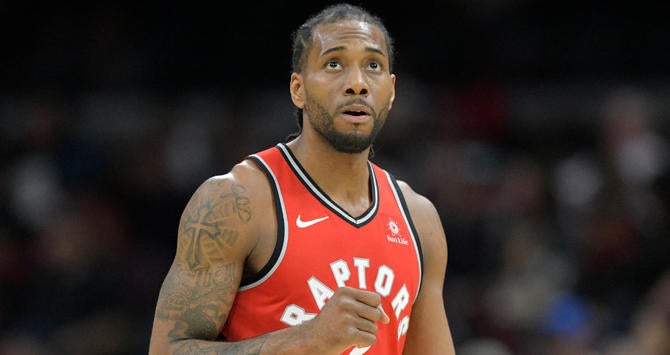
Like Irving, Kawhi Leonard has not participated in a playoff game since 2017. Leonard is putting up some of the best numbers of his career but has missed 19 games, mostly because of "load management" -- rest -- in order to keep his knee healthy. At a practice last month in New York, a reporter casually asked him how his knee was feeling because he'd missed the previous game. Leonard said it was fine and that wouldn't be the last game he'd sit out. He has not played in more than two consecutive games since.
This is part of a plan put together by the Toronto Raptors' medical staff, and it reflects the fact that Leonard is taking a big-picture approach. The 2014 NBA Finals MVP will do what he needs to do to be at his best when the games mean the most.
"There's 82 games and for me these are just practices," Leonard told reporters after hitting a game-winning shot against the Portland Trail Blazers recently, via TSN's Josh Lewenberg. "And playoffs is when it's time to lace them up."
When the playoffs arrive, there will be questions about which teams can take it to another level. Sometimes this is about playing stars heavier minutes, shrinking the rotation and the value of postseason experience. For teams like Warriors, Celtics and Raptors, it is also about focus. You don't want to be so amped up that you're trying too hard or overthinking, but you need to be stimulated. As Honnold said, you need consequences. Kerr, borrowing from Gregg Popovich, likes to talk about having "appropriate fear" -- too much fear can be paralyzing, but without any, you can get sloppy.
In this sense, it is not helpful to think of switch-flipping teams in terms of insulting fans, disrespecting the game or being apathetic. Toronto coach Nick Nurse recently said that, now that he's in charge of an NBA team, "I don't really feel the momentum/emotional swings up and down" the way he used to, via the Toronto Star's Doug Smith. His Raptors lost to the Magic recently, but he knows the Warriors did, too. On Sunday, Toronto played one of its best games of the season, beating the Miami Heat by 21 points. The next day, it played one of its worst, losing to the Cleveland Cavaliers by 25.
Nurse told reporters that the Cavs were "really up for the game" and the Raptors didn't match their energy. He didn't call out his team for dishonoring the basketball gods, only sounding a bit disappointed that they gave up so many open shots. A month from now, the regular season will be over and none of these contenders will have to play teams like Cleveland anymore. Few will remember these losses then, and it is hard to imagine that energy will be an issue.









